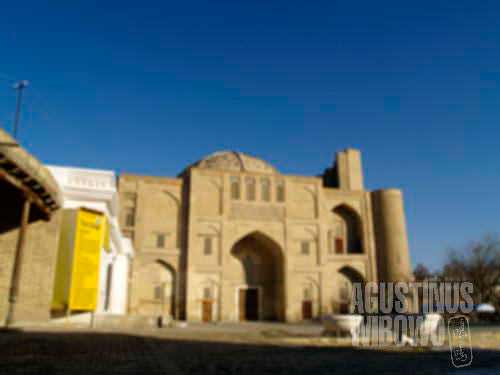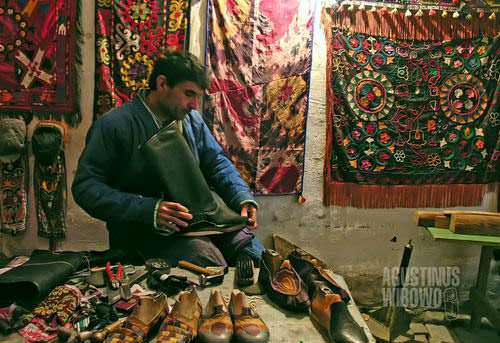Bukhara – Another Incident
My days in Uzbekistan seems never be far from incidents. Earlier in Tashkent I lost 400 US$ cash stolen. The other day in Samarkand I broke my camera. Then in Ferghana I experience some night hours in police station. Today, after the surprising climax that I will be thrown to my zero point, I have to experience other incidents at the last legs of this journey.
I took a night bus from Tashkent to Bukhara. But I came late. When I arrived in bus station near the Sabir Rahimov Metro Station, the latest to Bukhara had departed. But there was another bus departing to Navoi, 2 hours before Bukhara, and I decided to take this night bus.
It was 8 p.m. when I got in. But not until 11 the bus started the engine. I fell asleep since I got seated. Today was an exhausting day, as I was hunting for flight ticket to Malaysia and the fact that I am going home still shocked me.
The journey to Navoi takes about 5 hours at night. I couldn’t remember anything, but I notice that people sitting next to me always change. I paid a lot of attention to my bag, as it’s located under my leg, and to my camera bag with the new camera I just got from Indonesia.
At the middle of journey I was awaken up when someone tried to open my camera bag. I checked my bag but nothing was lost. I was very angry to this impolite fellow traveler. But I couldn’t do anything, just continued my sleep as I was extremely exhausted during the day.
I forget one wise advice: don’t be careless in night bus.
When I woke up, at 4, the bus stopped in its final destination: Navoi. I just found my mobile phone was already not in my pocket. I was so panicked. I checked my camera bag, not there. I checked below the seat, nothing. My shoulder bag was still locked (luckily it was still there). I just felt I finished my sweet dream and got slapped like this.
I asked the fellow passenger to call my mobile phone but it was switched off. 90% probability it has been stolen. And I was still panicked. Not because of the price of the machine, but I do have many important contact numbers in the phone.
I was rushed from the bus by the drivers. Now was 4 morning in Navoi. Cold. Dark. And there were hungry taxi drivers seeking passengers to take to Bukhara. I told a driver that I was not going to Bukhara as I didn’t have money anymore and my mobile is stolen.
He suddenly discussed with his friend. They speak Uzbek and not Persian Tajik so I didn’t understand much. In Navoi, unlike Bukhara, not many people speaking Persian. I communicate with the drivers in Russian.
“If you give 50 dollars, I can get your mobile phone back to you.”
I was panicked. 50 dollars sound a good price. “OK”
The other driver said, “No. 50 dollars was not enough. They won’t give it back. 100 Dollars is acceptable!”
I don’t have even 100 dollars in my pocket. But I just want the mobile back. I said OK to them.
This was how it worked. The drivers knew the biggest mafia in Navoi. The mafia is the boss of all thieves here. One driver was going to meet this boss to negotiate him to return back my mobile phone, and the other one waited for him with me in his taxi.
“Just put your money on the dashboard, so when your mobile phone come back, you will get it immediately,” said the driver.
I don’t want to be fooled. “No, I won’t.”
“Hey listen, we have nothing to do with the thieves. We just help you to get it back. None of your money will go to us.”
It was a long wait. Minute by minute passed silently. I started to contemplate and thinking to let my mobile phone away. It’s not worth the 100 dollars anyway. And I just think that I can get the numbers back again, and the thieves cannot sell my mobile phone anyway as it’s only in Indonesian and Chinese language (nobody will use it in Uzbekistan).
I was praying in my heart that the mobile phone won’t be found. I don’t want to lose my 100 dollars (which I even didn’t have) for the old mobile phone.
After 10 minutes the other driver came back. He had met the mafia boss but the mafia said they didn’t steal mine. Actually I didn’t know where I lost my mobile. It might be anywhere between Tashkent and Navoi. It’s some hundreds of kilometer distance. Somehow I felt happy that I didn’t need to pay the taxi drivers for their effort negotiating with the criminals.
There was a bus going to Bukhara at 4:30 stopping nearby. I jumped in immediately and was still thinking of my bad luck.
Thinking of bad luck will bring another bad luck comes. I forgot this wisdom in my panicky. When I got off the bus, my camera jumped out of its bag. I was so panicked that I kept checking my camera bag to find, who knows, my mobile phone was slipped somewhere there, and forgot to close my bag. So I left my bag opened when leaving the bus and my camera successfully made a high jump as it was to join an Olympic match.
It broke.
I arrived in Bukhara after jumping from climax to climax. I was an optimistic traveler, sure of my own fate-to-be after getting the Iranian visa and applying for Turkmen visa. Then from this optimistic wanderer I had to face the fact that I would be set back to my zero point, my homeland. I successfully managed to climb up again to be a happy ‘lost son’ to have the chance of returning home, but now being slapped directly on my face with the lost of mobile phone, and more slapping on my right face when my camera –my breathe- broke.
I stayed in Shuhrat’s house in Bukhara. But this time after the accidents I lost my mood of going around the old town. I stayed the whole day in the room. Shuhrat was studying in school and his father was working. His mother and sister were not at home. So I was bored in the room and found a novel slipped in my bag.
“Everything is the sign of the world,” said ‘the Alchemist’ written by Paulo Coelho, a book that a close Internet friend of mine, Maria Asten, sent to me last week. This book somehow reflected much of my journey, and I couldn’t stop even a single second since I started the first page. The book is about a boy traveling the world to find his fate, and meanwhile he learns about the signs the world gives to support everybody who tries all of his effort to reach his fate. Bad lucks are not bad lucks if we understand the world’s language. It’s just sign to head someone to his fate.
I remembered after I lost 400 dollars in Tashkent I was more motivated to get job and sell photos, and I got already a permanent job as photojournalist in Afghanistan. Isn’t that the way to my fate? God knows His best to make the plot of our live story.
It was a very good book. At midnight, when I finished reading, I felt fully recharged. Now I don’t take pity of myself anymore. I am not a poor, blurred guy on whom bad lucks always come. I am someone who is struggling to reach his dream.
Thank you, Paulo Coelho. Thank you for the inspiring Alchemist. And thank you Maria Asten, for giving me support exactly on the second I need it.




Gus, saya percaya tidak ada suatu hal yg kebetulan terjadi tanpa ada tujuannya. Segala sesuatu punya tujuan. Jadi, klo kamu sering bgt kehilangan sesuatu, pertama kamu mesti lebih hati-hati, lalu yang penting jangan mencap dirimu careless, jangan memberi label yg buruk sama diri sendiri. Kamu jadi semakin mengiyakan pada dirimu dan keadaan klo kamu memang layak utk mengalami semua itu. Inget lho rencanaNYA adalah rencana yg membawa kebaikan bagi semua orang yang percaya dan mengasihi DIA. Kan kmu sendiri yg bilang itu 🙂